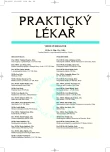Viral infections in patients after transplantation and with an immune response disorder
Virové infekce u pacientů po transplantaci a s poruchou imunity
Imunosupresivní léčba po transplantaci kostní dřeně či solidního orgánu a při autoimunitních chorobách vede ke zvýšenému riziku infekčních komplikací. Vzhledem k potlačení T-lymfocytární imunity patří virové infekce mezi nejčastější. Na rozdíl od obecné populace se uplatňují i oportunní patogeny. Dopad virových infekcí zahrnuje i dlouhodobé nepřímé vlivy jako je onkogenní potenciál a imunomodulační efekt s rizikem vzniku dalších oportunních infekcí.
Klíčová slova:
virové infekce, transplantace, imunodeficience.
Authors:
T. Reischig
Authors‘ workplace:
Přednosta: doc. MUDr. Martin Matějovič, Ph. D.
; Lékařská fakulta Universita Karlova
; Fakultní nemocnice, Plzeň
; I. interní klinika
Published in:
Prakt. Lék. 2007; 87(4): 250-252
Category:
Therapy
Overview
Immunosuppression following bone marrow or organ transplantation, or for the treatment of autoimmune diseases, results in an increased susceptibility to infection. Viral infections are the most common because of the suppression of T-lymphocyte immune responses and patients are more prone to opportunistic pathogens. In the longer term, viral infection may also have an impact on oncogenic potential and have an immunomodulatory effect, which may result in further opportunistic infections.
Key words:
viral infection, transplantation, immunodeficiencies.
Labels
General practitioner for children and adolescents General practitioner for adultsArticle was published in
General Practitioner

2007 Issue 4
- Advances in the Treatment of Myasthenia Gravis on the Horizon
- Hope Awakens with Early Diagnosis of Parkinson's Disease Based on Skin Odor
- Memantine in Dementia Therapy – Current Findings and Possible Future Applications
- Memantine Eases Daily Life for Patients and Caregivers
- Possibilities of Using Metamizole in the Treatment of Acute Primary Headaches
-
All articles in this issue
- Todays trends of diagnostics and treatment of scaphoid bone fractures
- An update on the Global strategy for asthma management and prevention – as viewed from the current situation in the Czech Republic
- Osteoarthritis – some new aspects of this disease
- Renal failure and renal replacement therapy in children
- Smoking and skin
- Is atap water suitable for the preparation of infant formula?
- Neurological complications of Q fever
- Perspectives of non-pharmacological treatment of atrial fibrillation – the MAZE procedure
- The importance of serum iron levels in patients with chronic hepatitis B and C.
- Extensive trombosis of thoracic aorta – an unusual source of acute peripheral arterial embolism.
- Epileptic fit as a syncope equivalent in severe aortic stenosis.
- Complications of atrial fibrillation in chlamydial myocarditis
- Capsule endoscopy and its current place in diagnostics of the gastrointestinal tract.
- Viral infections in patients after transplantation and with an immune response disorder
- Health Liability – an unusual case
- General Practitioner
- Journal archive
- Current issue
- About the journal
Most read in this issue
- Todays trends of diagnostics and treatment of scaphoid bone fractures
- Extensive trombosis of thoracic aorta – an unusual source of acute peripheral arterial embolism.
- Epileptic fit as a syncope equivalent in severe aortic stenosis.
- Smoking and skin
